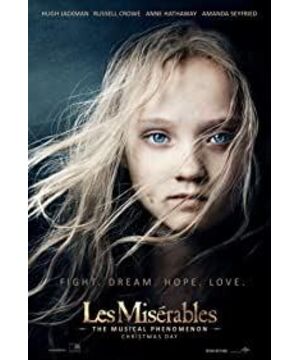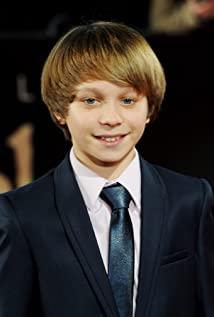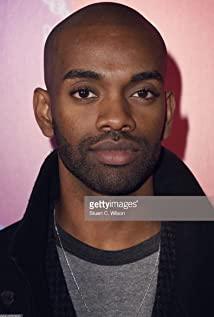Went to the cinema to see Les Miserables. I bought a ticket at the last minute of entering the venue. When I bought the ticket, a woman next to me asked in a puzzled tone, "How can I go to see Les Miserables". I ignored her. The conductor opened the seat selection page and saw that only 4 seats had been sold. I can't help but sigh. I don't think the theater I watched was the best, and the sound of Javert's suicide was bugged several times. The lights came on at the end of the film, and everyone else left. I wanted to finish listening to the ending song, but the staff had already started looking at me angrily. When I heard the beginning of "master of the house", the staff finally couldn't help but chase people away.
A great movie, but not a great viewing experience. An Oscar-winning work, I heard that it was a box office champion in Taiwan, but suffered such a miserable situation in the mainland. This work with the best sound should be played in the cinema with the best sound. In fact, I originally wanted to watch imax. When I knew that all the imax halls were given to The Hobbit and Les Miserables did not leave a single hall, I had a premonition that this movie viewing must be a niche experience. For the time being, I can attribute the reasons for this time to (the atmosphere of the mainland musical is not good/the Hobbit is too strong on the schedule/Internet piracy is first/Monday is not the peak period...), but in fact, I still feel more domestic The impetuousness and superficiality of the audience. In fact, many of Oscar's works, such as "The King's Speech", "The Artist", "A Farewell", etc., are not commercial films, but they are all good films that are worth savoring and shocking, and the best experience can only be obtained in the cinema. . Besides, "Les Miserables" is really, really wonderful.
In fact, I couldn't help but download the pirated version first, but stopped halfway through it. Because I decided that the "first time" of this movie had to be handed over to the cinema, or I would regret it for the rest of my life.
I know writing this article will definitely be very subjective and not objective. But that's fine, even if it's a subjective feeling. First of all, I have a relationship with Hugo and "Les Miserables". Hugo is my favorite novelist. I have read all his novels and even his picture books... In my eyes, he is an all-rounder. Students who have watched my own micro-movies may notice that my English name is Victor Chan. This Victor is the same as Victor Hugo. Actually I don't know if the word counts as a French name or an English name, but I like to use it that way.
I fell in love with "Les Miserables" the first time I saw it in junior high school. Although it is very thick, I also watched it more than three times. What I see more is the film and television works of Les Miserables. I've been voraciously looking for various versions of Les Misérables, the earliest being from the 1930s. Some versions are really hard to find. After seeing or searching on various forums, I downloaded them. Even if I were to find all these versions now, it would be difficult. In total, I have watched about 6 or 7 film and television versions, not counting the Japanese anime "Girl Cosette" and the movie "New Les Miserables". In the comparison of these versions, it can be said that I took the first lesson of adapting a novel to a movie. Each of these versions has its own strengths and weaknesses. I can intuitively feel which passages are good and which are wonderful and which are weak, but I regret that I never saw them. A perfect collection of all the strengths.
When I was in high school, I was exposed to the Les Misérables musical. It was the tenth anniversary edition at that time, and I loved it very much. At that time, I took the full script of the musical as English reading material, memorized it all at one time, and translated several classic passages. So to this day, I can sing most of the musical passages without reading the subtitles. Although I like musicals, in fact, musicals have also adapted a lot from the original book. I am not satisfied with many paragraphs. There are many dramatic things in the novel, which are not in the musical. At that time, I was thinking, although there are many versions of Les Miserables, no one has ever made a musical version of the movie. Is there any director who can make a musical version of the movie, and integrate the wonderful plots of the novel into it, and come to a fusion of the three art forms of novel, film and television, and musical? If no one does it, I even dream that I will one day have the opportunity to do it.
I took a musical class in college, and it can be said that I downloaded the 25th anniversary version of the Les Miserables musical video for the first time. It can be said with confidence that at that time it can be said that ordinary people could not search even if they wanted to. Because it just came out at the time, I have been on Baidu for a long time and there is no public download anywhere. Finally, I found a link in a very secret section of a musical exchange forum, using a code that only Les Miserables fans can see: "24601.avi"
Soon after, I heard about the Oscar-winning "The King" Les Misérables director Tom Hooper is about to make a musical version of Les Miserables. I didn't know how excited I was at the time. But will Tom Hooper's creative philosophy be the same as when I was in high school? I don't know if this movie will make me regret it in the end.
Today I can conclude that this movie is a masterpiece. I do not know what to say. I have inadvertently read a theory before, saying that in this world, there may be a person who is exactly the same as your soul in another corner. I feel like Tom Hooper might be that kind of guy. It might be a bit of an arrogance to say this, but he did what I wanted to do when I was in high school, or was eager to see a film made by others according to my creative philosophy. Yes, it perfectly combines the three art forms of novels, films and musicals.
There are several places where I have a lot of criticism about the adaptation of the original musical to the original.
There are two big paragraphs. The first one is the paragraph in the novel where Jean Valjean goes to the hotel to save Cosette. The beginning and the end are really wonderful, but the musical ignores a lot of details and deletes a lot of bargain, so that It weakens Cosette's encounter and reduces the dramatic conflict. Although the movie version cannot perfectly restore the novel due to the limitation of lyrics, it has made the greatest degree of remedial work. The childhood image of the key character Eponine appeared in advance, and the key props dolls also appeared. In the end, Javert's appearance and Madame Thenardier's appearance. The dialogue also adds to the drama.
The second was when the Thenardiers made a scene at the meeting. The musical version did not reflect the Thenardiers' sense of drama, but only focused on the comedy effect. Thenardier sang happy songs and successfully deceived food and drink at the dance, leading the theme to "People like me are everywhere" level. The film version has changed the lines, showing the Thenardiers' cleverness and being clever, and the punch I've been looking forward to for a long time, showing the original book. And the comedy arias with a more joyful style are sung while they are being carried away, which has a unique sense of irony in the film.
The other tiny paragraphs are mostly cohesive. For example, when you watch the musical version, you may not understand why Javert still wants to arrest Jean Valjean even though he has done nothing else. You may also not understand who Jean Valjean and Cosette escaped to Paris to help him. The movie version is better at connecting.
The film version has a large number of restorations of the novel, but it also eliminates the parts of the novel that do not conform to the aesthetics of modern dramas, and skips some parts that can be said or not. For example, when you watch the movie, you may not guess that Gavroche is also the son of the Thenardiers, but there is no need to explain it at all, and it is a bit excessive for the original novel to have so many key characters belong to the first family of Thenardiers. idealized. For example, when you watch a movie, you won't know that the man who was crushed under the car and rescued by Jean Valjean had done wrong with the mayor of Jean Valjean before, but Jean Valjean saved him regardless of his previous suspicions. The transformation brought about by the mind is no less than what Bishop Bian Furou brought to Jean Valjean. For example, when Jean Valjean dragged Marius into the sewer and looked at the intricate sewer, you may not immediately hear the famous saying in Hugo's original book "The sewer is the conscience of the city"... For example, in addition to this, there are many The egg-style arrangement, although the audience can't understand it, is a great enjoyment for the textual research party who is familiar with Les Miserables novels or musicals. For example, the huge fake elephant in the square during the Paris uprising, for example, the bishop's actor is the tenth anniversary version of Jean Valjean, for example, the tenth anniversary version of Madame Thenardier can be found in the pile of prostitutes, for example, Eponine is Original musical actor...
So it can be said that the film perfectly presents both the musical and the original. Recall that every character is not idle, the bishop, Jean Valjean, Fantine, Javert, Cosette, Marius, Eponine, Gavroche, the Thenardiers, everyone will give You are touched, laughed, cried, and excited at different levels... Can you expect more?
To say whether the film has shortcomings, of course there are, but they are all appropriate trade-offs. For example, the singing part is mostly solo, and some even do not cut the camera, which is definitely not suitable for audiences who are used to high-speed editing style movies. Sometimes I also wonder if Jean Valjean would edit some scenes of his suffering when he sings "i'm reaching but i fall", or if Fantine sings "he slept a summer by my side" and edit something about him Maybe even a few scenes she had encountered before would have been better. But if we do this at the same time, how can we appreciate that Anne Hathaway sheds tears at the right time, laughs at the right time, stops crying at the right time, sings at the right time while weeping, and sings at the right time in an uninterrupted shot. How about such an incomparably superb acting that calms down at the end of the lyrics? In addition to acting skills, so many calm long shots also show the realistic style of the whole film.
The music of the film definitely created a new era of musical theatre, and it is no exaggeration to say that it has redefined the musical theatre film. All the arias are recorded live instead of lip-syncing in the early stage and sung in front of the microphone later. In a metaphor, it seems to have really created a parallel world where singing is used to speak. For all actors, singing is speaking, and while they have high requirements for acting, the lyrics are more emotional, the sentences are more suitable for the plot, and they have a tone like the lines.
In the end, the only regret about the whole film is that the "god on high" that Jean Valjean sang when he was dying did not sing the ideal feeling. Listening to the ending of the twenty-fifth anniversary version, the version sung by the bishop in this movie really feels like a world of difference. However, after all, most of the people in the film are not professional singers. Come to think of it, although they are not as good as professional musical actors, these stars and big names have performed their singing skills exceptionally. In most of the arias, they did not give me a sense of incongruity, but were moved and surprised. In the words of the lyrics, "let the beating of the heart, echos the beating of the drum", it is no exaggeration to hear my blood and tears boil. I'm hearing enough.
Almost perfect Les Miserables. one of my best moments in my life.
Last but not least, the subtitles. The subtitles are too popular, so a lot of the original English rhythm is lost, and some English humor is not translated. What is even more regrettable is that it is obvious that some places have deliberately omitted the translation. The lyrics sing other sentences, and the translation still stays on the previous sentence. Intentional omission is to avoid what some translators consider sensitive or indecent. But I really want to say, do the translators really think the audience's affordability is so low? I was very impressed by the master of the house aria. When Madame Thenardier satirized Thenardier, she missed or twisted a lot. The sarcasm "I thought I was going to marry a prince...he's a lifelong shit" was completely ignored. It was supposed to be a good joke, but it was artificially missed. Then there is, "he has no much there" was originally a very vulgar irony, pointing to the bottom of Thenardier and saying that he had nothing there, but the translation made me dumbfounded, and turned it into something like "Silver Little. Steel gun" or something (silver wax tip). There are still many places in the future. It is possible to directly translate the vulgar humor of the bottom people, but it doesn't feel like it. Even pouting his ass (ass) has to be translated as "Put his buttocks." "...I feel that the translation this time is really not up to the standard. Of course, translation is also good. This time, the subtitles are finally not at the bottom for Wannian, and will be placed on the left or right of the screen in line with the picture. This is an improvement.
(There is a big correction at the end of the article... Driven by strong enthusiasm, the landlord went to the West End of London to watch the musical version of Les Miserables. Yes, it was just such a coincidence that I just had the opportunity, so I went. So I found that some of my views on Les Miserables musicals are wrong. The 10th and 25th anniversary editions that can be seen on the Internet are actually more like concerts for commemorative events, and the musicals that are usually staged are also sung. It was performed side by side, and some of the actions, props, sets, staging, and transitions were simply gorgeous. The main mistake in the text is the part of Jean Valjean saving Cosette. I thought that Eponine appeared early when she was a child, and The props of the doll are newly added in the movie based on the novel, but in fact the original musical is already there, and Epney's emotional line for Cosette is more plump in the musical. To show off, and help her mother to drive Cosette to fetch water together. After growing up, Eponine met Cosette, and the lyrics also included, why it was you, we grew up together, how was I at that time How were you at the time, but now... I can't remember the specifics, but the general content is like this. I feel that this emotional line is more complete, and the character of Epenny is more moving.)
View more about Les Misérables reviews











